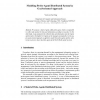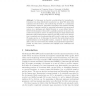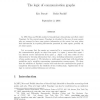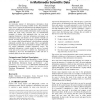122
click to vote
ICCSA
2010
Springer
15 years 7 months ago
2010
Springer
In the so-called Information-Explosion Era, astronomical amount of information is ubiquitously produced and digitally stored. It is getting more and more convenient for cooperative...
125
Voted
EPIA
2003
Springer
15 years 7 months ago
2003
Springer
: information contained in companies’ financial statements is valuable for decision making at various levels. Much of the relevant information in such documents is contained in t...
113
click to vote
CAISE
2003
Springer
15 years 7 months ago
2003
Springer
We propose a kind of agent called probe-agent, which is responsible to collect and monitor the data and information according to its goals. On the other hand, it can summarize the ...
160
Voted
AMKM
2003
Springer
15 years 7 months ago
2003
Springer
Every time a user engaged in work reads or writes, the user spontaneously generates new information needs: to understand the text he or she is reading or to supply more substance ...
115
click to vote
RIDE
2003
IEEE
15 years 7 months ago
2003
IEEE
In this paper, we present a scheme for identifying instances of events and extracting information about them. The scheme can handle all events with which an action can be associat...
138
click to vote
WEBDB
2004
Springer
15 years 7 months ago
2004
Springer
In our research on superimposed information management, we have developed applications where information elements in the superimposed layer serve to annotate, comment, restructure...
134
click to vote
ESWS
2004
Springer
15 years 8 months ago
2004
Springer
Abstract. In this paper we describe a methodology for harvesting information from large distributed repositories (e.g. large Web sites) with minimum user intervention. The methodol...
126
click to vote
DALT
2004
Springer
15 years 8 months ago
2004
Springer
In 1992, Moss and Parikh studied a bimodal logic of knowledge and effort called Topologic. In this current paper, Topologic is extended to the case of many agents who are assumed...
128
click to vote
MIR
2004
ACM
15 years 8 months ago
2004
ACM
An increasing amount of heterogeneous information about scientific research is becoming available on-line. This potentially allows users to explore the information from multiple p...
110
Voted
JCDL
2004
ACM
15 years 8 months ago
2004
ACM
Archaeologists have to deal with vast quantities of information, generated both in the field and laboratory. That information is heterogeneous in nature, and different projects ha...





